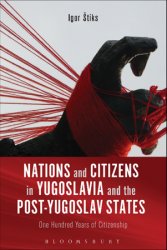
Автор: Igor Stiks
Название: Nations and Citizens in Yugoslavia and the Post-Yugoslav States: One Hundred Years of Citizenship
Издательство: Bloomsbury Academic
Год: 2015
ISBN: 1474221521
Язык: English
Формат: pdf
Размер: 14,9 mb
Страниц: 240
Between 1914 and the present day the political makeup of the Balkans has relentlessly changed, following unpredictable shifts of international and internal borders. Between and across these borders various political communities were formed, co-existed and (dis)integrated.
By analysing one hundred years of modern citizenship in Yugoslavia and post-Yugoslav states, Igor ?tiks shows that the concept and practice of citizenship is necessary to understand how political communities are made, un-made and re-made. He argues that modern citizenship is a tool that can be used for different and opposing goals, from integration and re-unification to fragmentation and ethnic engineering.
Preface and Acknowledgements x
Introduction: A Balkan Laboratory of Citizenship 1
A century of dis/integrations 1
Citizenship and citizenship regime 4
In Yugoslavia, and after: Citizenship as research field, citizenship as battlefield 11
Citizenship as a political history of Yugoslavia and the post-Yugoslav states 17
Part 1 From National Integration to the First Disintegration 23
1 Brothers United: The Making of Yugoslavs 25
Brothers as aliens: From Yugoslavism to Yugoslavia 25
Brothers as citizens: The belated birth of Yugoslav citizenship 30
Precarious birth, fragile existence and the brutal death of the first Yugoslavia 34
2 Revolutionary Brothers: The Communist Formula for Yugoslavia 37
Yugoslav communists: Solving the national question 38
Wartime: Enemies or brothers? 47
From brothers in arms to federated citizens 50
Part 2 From Socialist Re-Integration to the Second Disintegration 53
3 Brothers Re-United! Federal Citizenship in Socialist Yugoslavia 55
Centralist federalism, 1945–1967 55
Bifurcated citizenship 62
Self-management, decentralization and citizenship 66
4 Brothers as Partners: Centrifugal Federalism, Confederal Citizenship and Complicated Partnership 71
Centrifugal federalism, 1967–1974 71
From federal to confederal citizenship 79
Broken partnership: From confederal citizenship towards crisis 82
5 The Bridges Over the Miljacka: The Long Farewell to Yugoslav Citizenship 89
Yugoslavism: Fading of an idea 90
Yugoslavia: Only a matter of interests? 93
Code red: Turning citizens into enemies 97
Part 3 From Nationalist Disintegration to War 101
6 Partners into Competitors: Divisive Democracy and Conflicting Conceptions of Citizenship 103
Democracy and nationalism 104
Citizens as voters: Democratize and divide 110
A secret handshake between nationalism and electoral democracy 116
7 Where is My State? Citizenship as a Factor in Yugoslavia’s Disintegration 119
So, why did it happen? 119
Relevant factors of Yugoslavia’s disintegration 121
The citizenship factor 128
8 Enemies: Citizenship as a Trigger of Violence 133
The dark side of 1989: Violence in post-socialist Europe 133
Triggers of violence: Citizenship, borders and
territories, and the role of the federal military 138
Conclusion: The price of war 146
Part 4 From Ethnic Engineering to European Re-Integration? 149
9 From Equal Citizens to Unequal Groups: The Post-Yugoslav Citizenship Regimes 151
The citizenship conundrum in post-socialist Europe 152
Ethnic engineering after Yugoslavia: The included, the invited, the excluded and the self-excluded 156
Enemies into neighbours: Unconsolidated and overlapping citizenship regimes 165
Concluding remarks: From ethnic engineering to ethnic democracies 168
10 Partners Again? The European Union and the Post-Yugoslav Citizens 173
The EU’s direct and limited influences 174
Five ways to (mis)manage the post-Yugoslav citizenship regimes 176
Partners, or just neighbours? 183
Epilogue: The Citizenship Argument – Why Are We in This Together? 187
Notes 194
Bibliography 203
Index 215
|